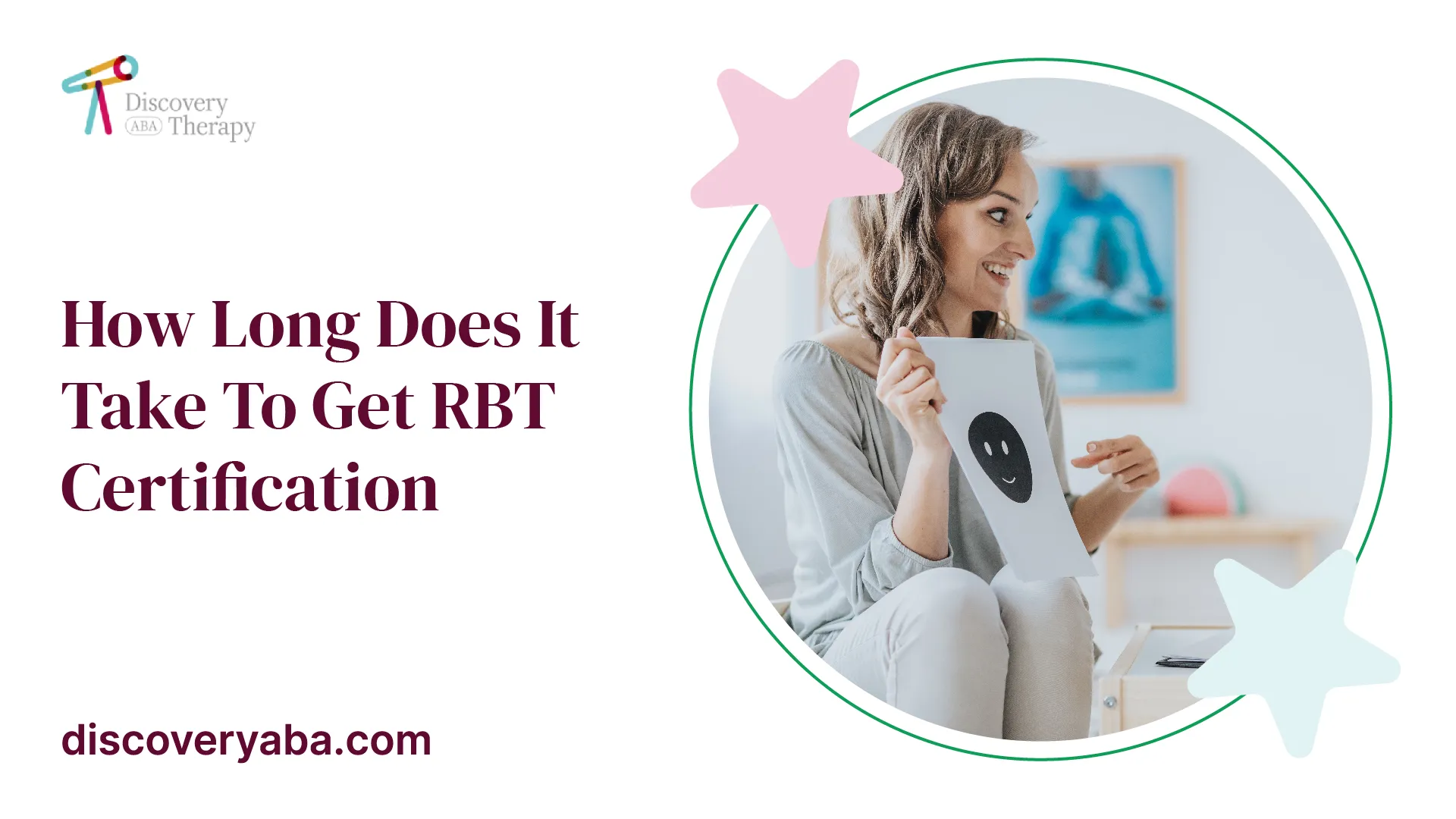How Long Does It Take To Get RBT Certification
Planning on getting RBT certified? Read on to find out how long it takes.

How Long Does It Take To Get RBT Certified?
It takes about four weeks to get RBT certified, which includes a 40-hour training course that's done on the web or in the presence of an official appointed by the BACB.

The Registered Behavior Certification, or RBT, is the accepted credential for working in the field of Applied Behavior Analysis. RBTs are subordinate to BCBAs, or Board Certified Behavior Analysts.
They coordinate different behavioral intervention plans for people with varied disorders, most commonly autism. People that are interested in becoming an RBT often ponder about the amount of time it takes for them to become certified.
The first step to begin RBT certification is for one to be sure they meet the requirements. Applicants must be 18 years old or above, and have a high school diploma, GED, or equivalent.
They must also finish at least 40 hours of behavior analysis training, and complete a background check. Supervision is required by a BCBA or BCaBA that manages and checks work done by RBTs.
There's lots of variability in the amount of time it takes for all eligibility requirements to be done.
It may change based on one's experience working in the ABA field and the availability of the training. The training course is 40 hours and is usually available as an online or in-person course, taking between one to two months to finalize.
As for the criminal background check, it may take several weeks before it's done, which may involve a soft inquiry into one's credit history.
After the eligibility requirements are met, one can begin their applications to take the RBT exam through the BACB, or Behavior Analyst Certification Board. The cost for the application is $50. Documentation must be given proving their eligibility. It takes between seven to 14 days to finish the application process, on average.
The next step is to make a schedule for the RBT exam, then take it.
After the application is accepted, one can schedule the exam online. The most common way to do this is through Pearson VUE, which charges a fee of $45 and allows each applicant 90 minutes to finish 75 questions, all of which are multiple-choice.
The exam itself includes different relative topics about ABA therapy practices like assessing clients, getting measurements, behavior reduction, professional conduct, skill acquisition, reporting, and documentation.
Applicants are required to score 80% or higher to pass the exam. The amount of time it takes for one to set up and take the RBT exam can change from each person, the availability of the exam, and the location in which it takes place There are testing centers with a waiting list.
For this reason, hopefuls are suggested to make a schedule for the exam as soon as they can. But in most instances, applicants begin taking the exams no later than two weeks after it's scheduled.
Once the RBT exam is passed, a competence assessment must be done. This is needed to help determine one's ability to carry out behavioral intervention plans while under the supervision of a BCBA. A BCaBA might also carry out the supervision. Applicants are given no more than 90 days to pass the competency assessment after completing the exam.
However, the amount of time it takes to finalize the competency assessment can change. Supervisor scheduling and the complexity of behavioral intervention plans might extend it out longer than what would be anticipated.
Applicants are also required to work under supervision for no less than 5% of their total hours spent under the management of a BCBA. During this time, competency must be shown in RBT.
After someone finishes completing their RBT certification, the process doesn't stop. One must maintain their certification by staying on top of all requirements.
For instance, RBTs must finish a yearly education on all subjects relative to their RBT certifications, undergo a bi-annual criminal background check, and acquire a certification renewal every year. In all areas of re-examination, the RBT must adhere to the RBT code of ethics and order laid out by supervisors.
While it might seem that RBT certification is a challenge, this is necessary given the importance of the work being done. RBTs work closely with small children regularly, some of whom might be special needs and require intensive therapy.
In most circumstances, it'll take someone three months to finish their RBT certification, along with their requirements for eligibility, scheduling for exams, preparing for them, passing the test, and getting through the competency exam.
What is the RBT certification?
The RBT certification is credited to positions where ABA is given to patients and clients. It's widely recognized in the field. RBTs perform their duties under the supervision and guidance of BCBAs to help build behavioral plans for patients.
The RBT certification is given to people that have finished all the needed training for the RBT position, and people that show competence in producing behavior intervention plans in the presence of a BCBA.
The certification mandates the completion of training that lasts for 40 hours or more, primarily in behavior analysis.
The background check mentioned previously is typically done during this step so the hopeful can move on to the RBT exam.
Since much of the work that RBTs do involves close interaction with children and young adults, strict codes of ethics must be followed at all times. RBTs also work with individuals directly with clients in one-on-one sessions.
They give both interventions and supper when they're required. Some areas of support may involve prompting clients to engage with them in specific behaviors they exhibit, and giving positive reinforcement to raise the chances of certain behaviors taking place with them.
They also implement plans to lower undesirable behaviors.
The RBT certification is important since it makes sure that the people employed as RBTs have the right level of training, competence, and skills to take on behavior intervention plans according to what was learned before granting certification.
It's imperative for the well-being and safety of clients, who might be in states and circumstances making them vulnerable to self-harm.
An RBT certification is also an asset to ABA in its entirety.
It grants standards and boosts ABA practices that are based on evidence and research. The entire process for certification mandates supervision that goes on during the RBTs career, ensuring that they're giving services in the most professional manner possible.
Even with the RBT certification being a widely accepted credential for ABA, ongoing training is a must since it lowers the chances of RBTs forgetting their knowledge of all subjects learned by them during their initial training period.
The role of an RBT is to closely work with clients to produce interventions that allow them to reach their goals, along with the mission of the BCBA.
The multi-hour course and other vetting necessities are the reason why RBTs are so properly trained in dealing with children and adults that are diagnosed with disorders such as ADHD and autism.
When Does RBT Certification Expire?
The RBT certification that's issued by the BACB remains valid for one year. The only way that this is extended is through taking the exam again the following year.
RBTs are required to keep up with their knowledge of their past training to get another extension, which also includes a competency assessment. If for some reason the requirements aren't met by the RBT, the certification could expire, even before they've had it for a year.
RBTs can renew certifications by submitting them online.
This is done by paying a fee and finishing the CEUs, also known as continuing education units. After the CEUs are granted, the competency assessment follows. Once that's passed, a renewal of certification for another year is granted.
RBTs are encouraged to maintain a track record of their certification's expiry date and to be sure they're up to date on the needed requirement for the certification to be renewed.
Qualification Requirements For RBT Training
For someone to become an RBT, certain training and qualifications are needed to be passed, all of which are set up by the BACB. As listed, here are the primary requirements:
- Age limitations - All candidates are required to be 18 years or older
- Education level - RBTs aren't required to have a college degree but must possess a high school diploma or equivalent, such as a GED.
- Background - Applicants must pass a background check, whereby people with specific felonies and criminal histories may not be permitted to go through RBT training.
- Additional training - RBT hopefuls must take a 40-hour training program that's predicted on the RBT Task List, which can be done either online in the physical presence of a supervisor that's appointed by the BACB.
- Competency assessments - This is given in front of supervisors and the final step is done before one can sign off on their certification.
How RBT Training Works
RBT training works by giving candidates the skills needed to work with special needs people and those with an autism spectrum disorder.
After confirming eligibility, candidates must be enrolled with a provider that's approved by the BACB. The coursework is 40 hours and teaches skills such as behavioral reduction and ethics.
References
Does Your Child Have An Autism Diagnosis?
Learn More About How ABA Therapy Can Help
Find More Articles
Contact us
North Carolina, Nevada, Utah, Virginia
New Hampshire, Maine
Arizona, Colorado, Georgia, New Mexico, Oklahoma, Texas
.avif)




































































































